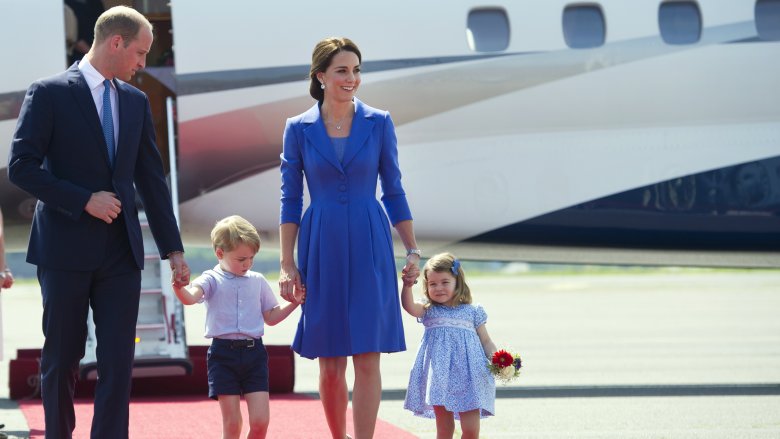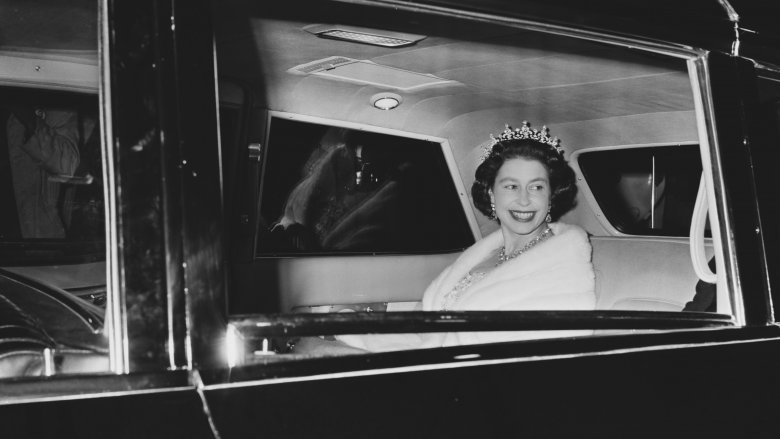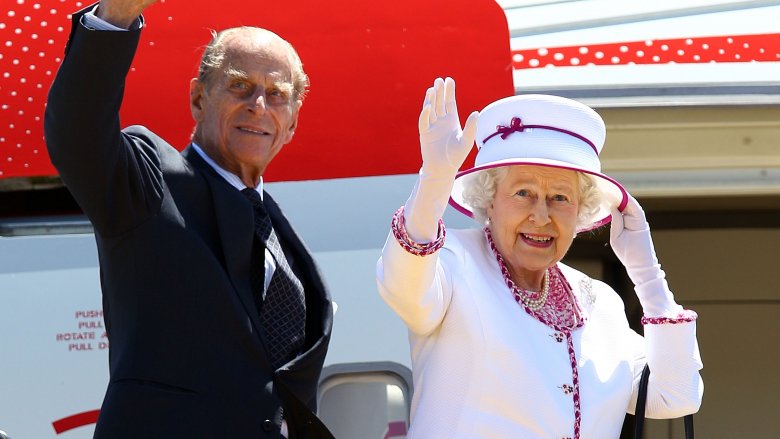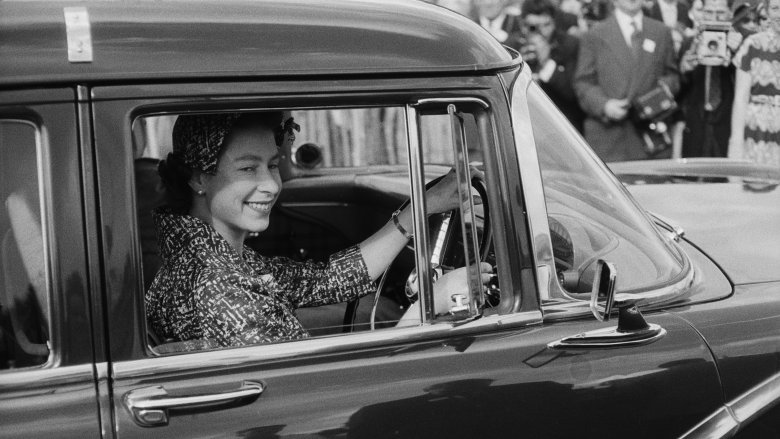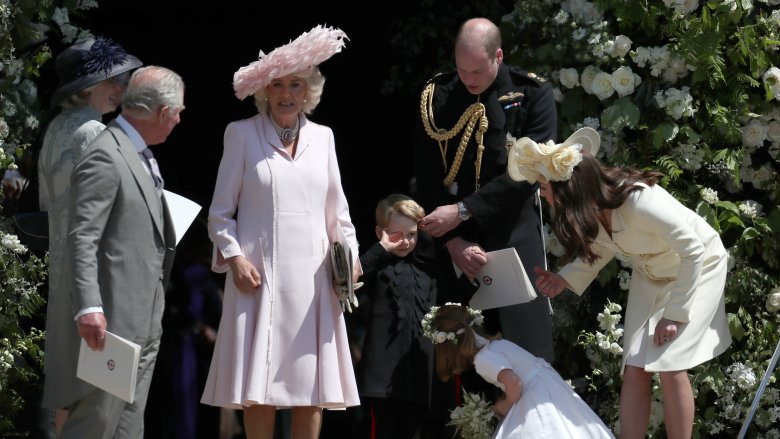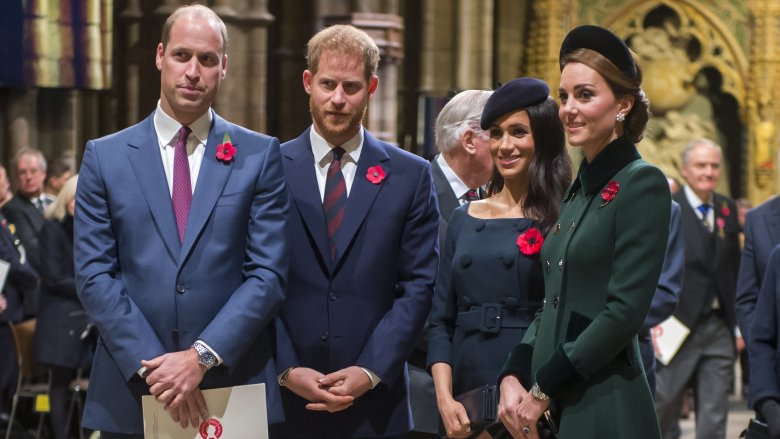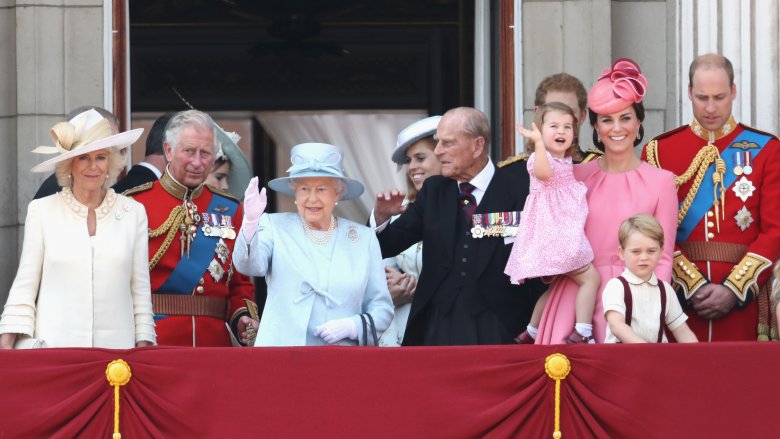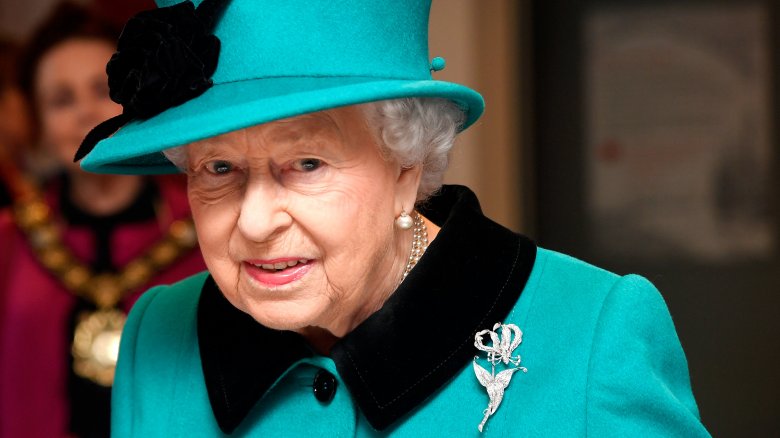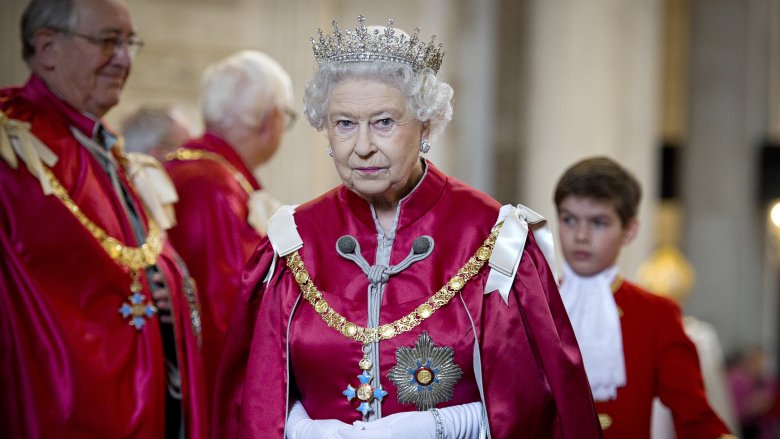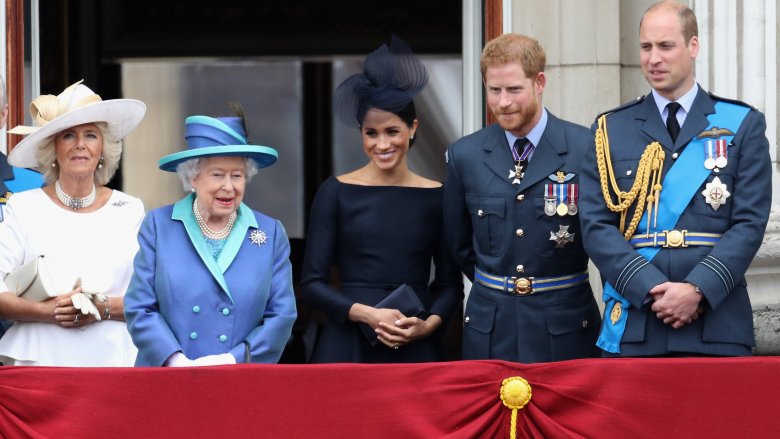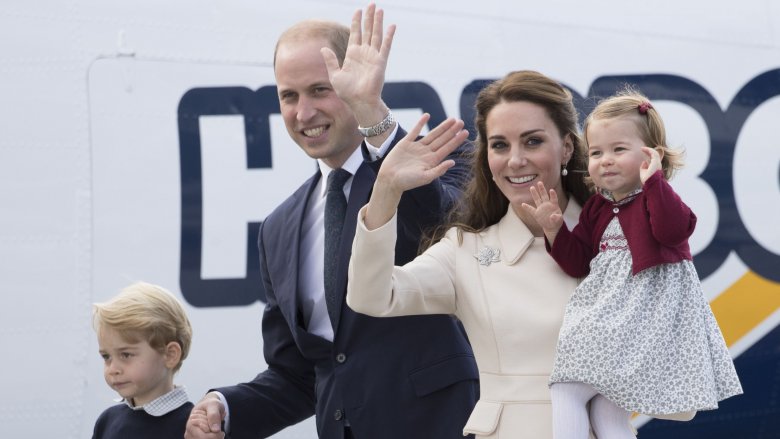Laws The Royal Family Doesn't Have To Follow
The days of British monarchs being able to get away with pretty much anything are (thankfully) over, but the royal family still isn't quite like the rest of us. For starters, humble commoners are subject to all the laws of the land. While royals still have to follow most of the laws that govern the rest of us, there are a few pieces of legislation that simply don't apply to them.
Being above the law isn't quite as fun as you might think, though, and it definitely isn't enough to outweigh the responsibilities that come with royal status. Many of these exemptions only apply to the reigning monarch, but don't extend to her husband or to her family, and they are more about protecting the Crown than they are about giving royals special perks. Some of the laws the royal family is exempt from even make their lives more restrictive. Just how much can the royal family get away with? Keep reading to find out.
Vehicles they are riding in can legally break the speed limit
Being a member of the royal family doesn't mean that you can drive as fast as you want, but it does mean that there are times you can have your driver break the speed limit. A Department for Transport representative explained to The Sun that, under U.K. law, "speed limits do not apply to any motor vehicle being used for police, fire and rescue authority, ambulance or Serious Organised Crime Agency (SOCA) purposes, if observing the speed limit would be likely to hinder the use of the vehicle for the purpose for which it is being used on that occasion."
Since the royal family (as well as the prime minister) are driven by police while conducting official royal business, they have some leeway to break the speed limit under this law. The pass doesn't apply to them when they're out and about on their own, however. In 2001, Princess Anne was fined £400 for driving 93 mph in a 70 mph zone.
The queen doesn't need a passport to travel
Getting a passport can be a hassle. Not only do you have to fill out a bunch of paperwork and pay a fee, but you also have to pray that your picture turns out just right. Unfortunately, if you hope to travel to another country, you're not going to be able to without that booklet. That is, unless, you're the queen of England. Queen Elizabeth II can reportedly travel wherever she wants without carrying proof of citizenship.
According to the royal website, each U.K. passport carries the following text: "Her Britannic Majesty's Secretary of State requests and requires in the name of Her Majesty all those whom it may concern to allow the bearer to pass freely without let or hindrance and to afford the bearer such assistance and protection as may be necessary."
Since the passport is issued in her name, it makes it unnecessary for the queen to carry one.
The queen isn't required to have a driver's license
Chances are, the queen is never asked for her ID since she is one of the most recognizable people in the world. This is a good thing, since proving her identity might be a bit tricky otherwise as the queen doesn't have a passport and doesn't even have a driver's license. It's not because she doesn't drive, either. The queen has been comfortable behind the wheel since she was a teenager but, as the monarch, is not required to pass a driving test or have a license in order to drive.
This privilege is one that only applies to the monarch — the rest of the family has to pass a driving test and carry a license just like everyone else. The queen herself (along with her husband, Prince Philip) helped her children learn to drive in preparation of their tests (which they passed). The perk is not one that the queen takes much advantage of, though. She mostly restricts her driving to her private estates.
They don't need to use a last name
Unlike most people who go by a first, middle, and last name, many members of the royal family don't need to use a last name at all.
Technically, their last name was Saxe-Coburg-Goth up until 1917 when King George V decided that the family name would be Windsor, per the House of Windsor website. The current family name of Queen Elizabeth II's descendants is Mountbatten-Windsor (Mountbatten being Prince Philip's surname), but they don't have to use it if their title is "His Royal Highness Prince" or "Her Royal Highness Princess."
When they do use a last name, they can choose something other than their actual last name, such as their family's territorial designation. As sons of the Prince of Wales, Prince William and Prince Harry entered the military under the names William Wales and Harry Wales.
While the royal family doesn't need a last name, they make up for it with a long list of given names. For example, Prince Charles' full given name is Charles Philip Arthur George and the queen's is Elizabeth Alexandra Mary.
They are exempt from the Freedom of Information Act
The U.K.'s Freedom of Information Act (FOI) allows people to request access to public sector organization records. Anyone in the world, regardless of age or nationality, is able to request information under the act. Organizations the public is allowed to request information from include local councils, schools, government departments, the police, and publicly owned companies. The act is meant to provide some transparency into the workings of the government to build trust between them and the people. You'd think that, as part of the government, the royal family would also fall under the Freedom of Information Act, right? Not quite.
Politicians and civil servants must provide information about what they do in an official capacity if an FOI request is filed, but the monarchy is not obligated to. Their exemption means that people who want to know what the royal family does with public funds are out of luck. It also prevents people from knowing just how much the royal family influences government policy.
The monarch gets custody of all their descendants
When you have a baby, it's pretty much assumed that your child will be your responsibility for at least the next 18 years. If you're a royal, however, the law operates a bit differently. No matter how good of a job you're doing raising your kids, they can be taken away from you at any time by the queen as the reigning monarch automatically has custody of minor grandchildren. "This goes back to King George I [who ruled in the early 1700s], and the law's never been changed," royal expert Marlene Koenig told News.com.au. "He did it because he had a very poor relationship with his son, the future King George II, so they had this law passed that meant the King was the guardian of his grandchildren."
While it doesn't seem likely that Queen Elizabeth II would actually try to take a child away from their parents, Prince Charles and Princess Diana did consult with her before taking Prince William and Prince Harry on trips. "Technically, they needed permission for travel," said Koenig. "The Queen has the last word on parenting decisions like that."
Civil and criminal proceedings can't be taken against the queen
Theoretically, the queen could get away with murder. While the royal family is not actually above the law, the official royal website states that "civil and criminal proceedings cannot be taken against the Sovereign as a person under U.K. law." This means that, while the law does apply to Queen Elizabeth II, if she were to break one, there wouldn't be much that anyone could do about it.
This is a perk that could easily be dangerous in the wrong hands. Not only could a monarch in this position abuse their power, but their bad behavior could also potentially cause the country to revolt. Fortunately, the queen recognizes that her power comes with great responsibility. The royal website assures us, "The Queen is careful to ensure that all her activities in her personal capacity are carried out in strict accordance with the law."
The Crown is exempt from taxes
Another perk of being royal is that you don't have to pay taxes ... well, sort of. The Crown is legally exempt from paying income tax, and many members of the royal family have portions of their income exempt from taxes if the money they earn is related to their royal duties. The Prince of Wales, for example, is not obligated to pay taxes on his income from the Duchy of Cornwall which generates millions of pounds of revenue each year. The duchy was actually created in the 14th century to provide the heir to the throne with an income, which is why it is tax exempt. Prince Charles does, however, voluntarily pay income tax on the duchy. The queen, who receives her income primarily from the government and from private estates, has also voluntarily paid taxes since 1992.
Income not related to the Crown, such as investment profits Prince William and Harry earn from their late mother's estate, are fully taxable.
They don't have to serve jury duty
In the U.K., skipping out on jury duty results in a hefty fine of £1,000. There's no real way to get out of jury duty if you're summoned, although you're allowed to defer service one time under certain circumstances. Jurors are not compensated for their time, although they can be reimbursed for some food or transportation costs as well as childcare costs and lost earnings.
It's easy to see how serving jury duty can pose difficulties for people, especially if they have to take time off work and arrange for child care. Members of the royal family, however, have an easy out and are able to be excused simply because they are royal. For a long time, this exemption applied to anyone in the royal household, including servants. In 2003, however, members of Parliament convinced the government to abolish the exemptions for members of the royal household and the extended family. Now, the only members of the household who can be excused from jury duty are the queen and her immediate family.
They might be exempt from having to purchase a TV license
In the U.K., if you want to watch live TV — or even pre-recorded programs as they're being aired — you're going to have to purchase a license. The license costs £150.50 per year per household and is a separate cost from cable fees. Watching TV without a license can result in a fine of up to £1,000, plus any legal costs incurred.
In 2013, journalist Gordon McIntosh wrote to the British Broadcasting Corporation (which issues the licenses) to ask if the royal palaces must also pay for a TV license and, if they didn't pay the fee, if they would be forced to pay a fine. The BBC refused to reveal details about whether or not the palaces are required to have a license. According to the BBC, the information is personal and therefore does not need to be disclosed to the public under the Freedom of Information Act.
McIntosh appealed the decision, but a tribunal ruled in favor of the BBC. For now, at least, the question of whether or not being royal exempts you from needing a TV license will remain unanswered.
